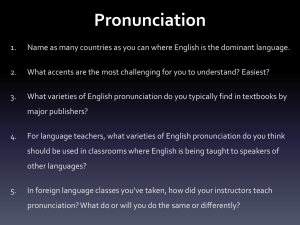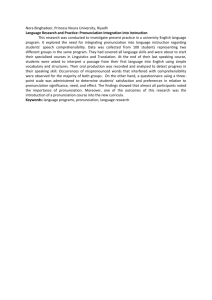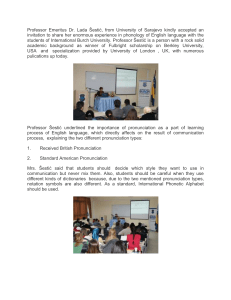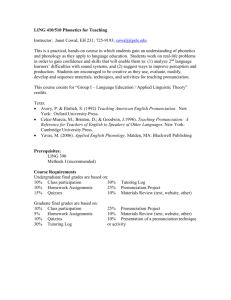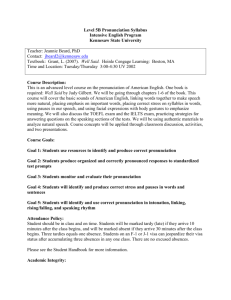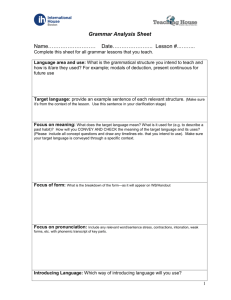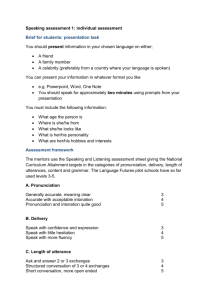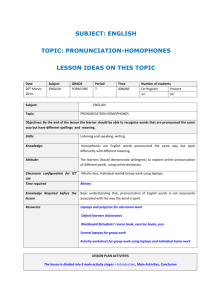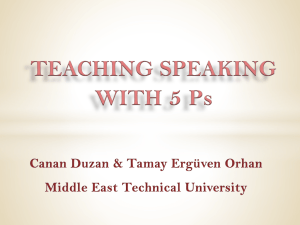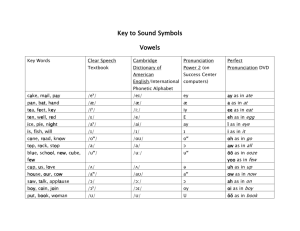Module 4 "Teaching Pronunciation" Task1. Read the following
advertisement
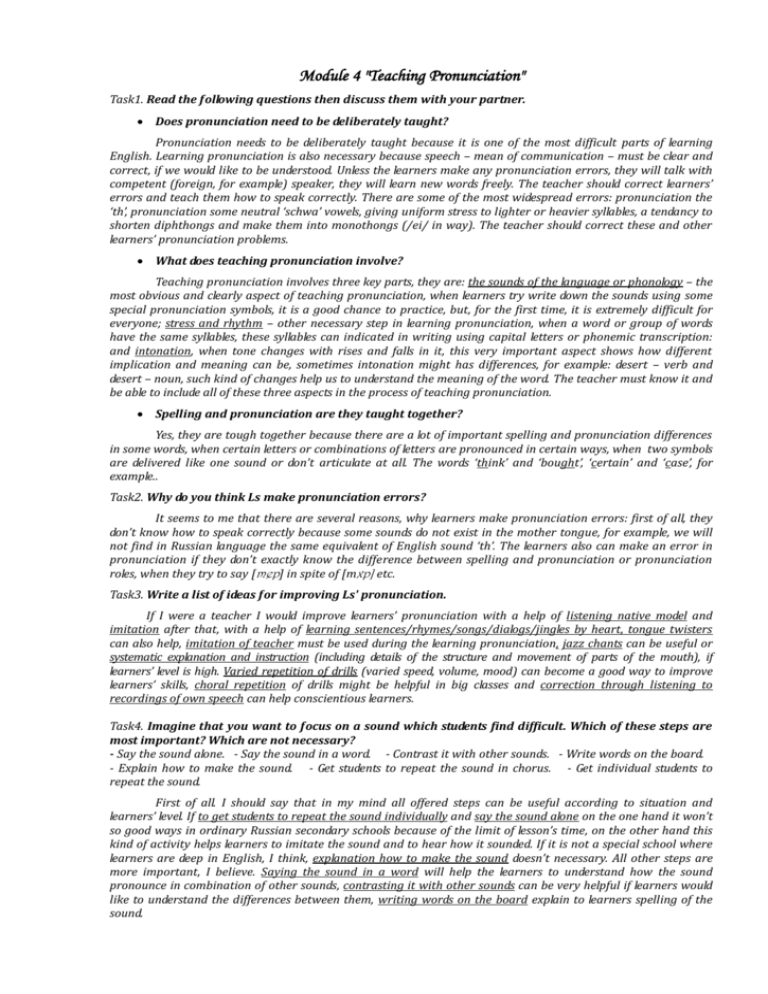
Module 4 "Teaching Pronunciation" Task1. Read the following questions then discuss them with your partner. Does pronunciation need to be deliberately taught? Pronunciation needs to be deliberately taught because it is one of the most difficult parts of learning English. Learning pronunciation is also necessary because speech – mean of communication – must be clear and correct, if we would like to be understood. Unless the learners make any pronunciation errors, they will talk with competent (foreign, for example) speaker, they will learn new words freely. The teacher should correct learners’ errors and teach them how to speak correctly. There are some of the most widespread errors: pronunciation the ‘th’, pronunciation some neutral ‘schwa’ vowels, giving uniform stress to lighter or heavier syllables, a tendancy to shorten diphthongs and make them into monothongs (/ei/ in way). The teacher should correct these and other learners’ pronunciation problems. What does teaching pronunciation involve? Teaching pronunciation involves three key parts, they are: the sounds of the language or phonology – the most obvious and clearly aspect of teaching pronunciation, when learners try write down the sounds using some special pronunciation symbols, it is a good chance to practice, but, for the first time, it is extremely difficult for everyone; stress and rhythm – other necessary step in learning pronunciation, when a word or group of words have the same syllables, these syllables can indicated in writing using capital letters or phonemic transcription: and intonation, when tone changes with rises and falls in it, this very important aspect shows how different implication and meaning can be, sometimes intonation might has differences, for example: desert – verb and desert – noun, such kind of changes help us to understand the meaning of the word. The teacher must know it and be able to include all of these three aspects in the process of teaching pronunciation. Spelling and pronunciation are they taught together? Yes, they are tough together because there are a lot of important spelling and pronunciation differences in some words, when certain letters or combinations of letters are pronounced in certain ways, when two symbols are delivered like one sound or don’t articulate at all. The words ‘think’ and ‘bought’, ‘certain’ and ‘case’, for example.. Task2. Why do you think Ls make pronunciation errors? It seems to me that there are several reasons, why learners make pronunciation errors: first of all, they don’t know how to speak correctly because some sounds do not exist in the mother tongue, for example, we will not find in Russian language the same equivalent of English sound ‘th’. The learners also can make an error in pronunciation if they don’t exactly know the difference between spelling and pronunciation or pronunciation roles, when they try to say [mep] in spite of [mxp] etc. Task3. Write a list of ideas for improving Ls' pronunciation. If I were a teacher I would improve learners’ pronunciation with a help of listening native model and imitation after that, with a help of learning sentences/rhymes/songs/dialogs/jingles by heart, tongue twisters can also help, imitation of teacher must be used during the learning pronunciation, jazz chants can be useful or systematic explanation and instruction (including details of the structure and movement of parts of the mouth), if learners’ level is high. Varied repetition of drills (varied speed, volume, mood) can become a good way to improve learners’ skills, choral repetition of drills might be helpful in big classes and correction through listening to recordings of own speech can help conscientious learners. Task4. Imagine that you want to focus on a sound which students find difficult. Which of these steps are most important? Which are not necessary? - Say the sound alone. - Say the sound in a word. - Contrast it with other sounds. - Write words on the board. - Explain how to make the sound. - Get students to repeat the sound in chorus. - Get individual students to repeat the sound. First of all. I should say that in my mind all offered steps can be useful according to situation and learners’ level. If to get students to repeat the sound individually and say the sound alone on the one hand it won’t so good ways in ordinary Russian secondary schools because of the limit of lesson’s time, on the other hand this kind of activity helps learners to imitate the sound and to hear how it sounded. If it is not a special school where learners are deep in English, I think, explanation how to make the sound doesn’t necessary. All other steps are more important, I believe. Saying the sound in a word will help the learners to understand how the sound pronounce in combination of other sounds, contrasting it with other sounds can be very helpful if learners would like to understand the differences between them, writing words on the board explain to learners spelling of the sound. Task5. Write a list of ideas f or pronunciation-spelling correspondence. - Dictation: of random lists of words, of words that have similar spelling problems, of complete sentences, of half-sentences to be completed. - Reading aloud: of syllables, words, phrases, sentences. - Discrimination (1): prepare a set of 'minimal pairs' - pairs of words which differ from each other in one sound-letter combination (such as dip-deep in English). Either ask learners to read them aloud, taking care to discriminate, or read them aloud yourself, and ask students to write them down. - Discrimination (2): provide a list of words that are spelt the same in the learners' mother tongue and in the target language: read aloud, or ask learners to, and discuss the differences in pronunciation (and meaning!). - Prediction (1): provide a set of letter combinations, which are parts of words the learners know. How would the learners expect them to be pronounced? (Then reveal the full word)ю - Prediction (2): dictate a set of words in the target language which the learners do not know yet, but whose spelling accords with rules. Can they spell them? (Then reveal meanings.) Some other ideas that practise pronunciation-spelling correspondences may be found in pronunciation books
